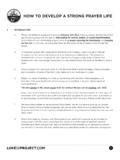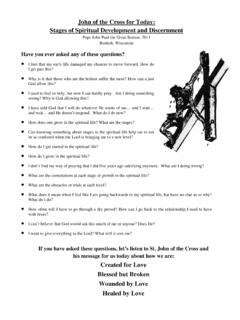Transcription of EFFECTIVE COMMUNICATION IN A MARRIAGE
1 EFFECTIVE COMMUNICATION IN A MARRIAGE . Early in our MARRIAGE we attended a one-day MARRIAGE seminar. There were a variety of couples there, some who had been married for 20 years or more, some just a few years, and one couple who were not yet married. One of the exercises they asked us to do was a questionnaire which was designed to test how well we knew our spouse. After we had done the exercise they compared our marks. The couple who scored the highest were you guessed the engaged couple! When we are in love , as I have said, we do seem to communicate quite naturally but as time goes on we need to make a deliberate commitment to work at it. It doesn t just happen by itself. It is a bit like rowing upstream. If you stop rowing you will drift backwards.
2 Perhaps you have drifted and find there is some distance between you and your spouse, what do you do to draw close again? Without COMMUNICATION there can be no real relationship. learning to communicate is like building a bridge between the two of you so that you can move towards each other. LEVELS OF COMMUNICATION . Five different levels of COMMUNICATION have been identified. These levels move from shallow, surface levels of communications to the deep, meaningful level that enables you to enjoy a closeness and intimacy that God intended for MARRIAGE .. This is when COMMUNICATION is reduced to the bare essentials, greetings or formalities. There may be requests to pass the salt or who is picking up the kids? , but nothing is said that doesn t have to be said.
3 Facts Here conversation takes place but it is conversation that is very safe and unthreatening. The couple will talk about events or people that are out there . Own Ideas and Opinions This is beginning to go a little deeper as now the person is starting to open up about themselves about what they think. Saying I don t think our daughter should dress like that carries with it the note of disagreement, argument and even potential rejection. Feelings and Emotions Our COMMUNICATION goes to a new level when we begin to express how we feel. Men find this particularly hard (I m generalising) especially as often we are not even aware of the emotions within us. Eg. I was afraid you would reject me or I feel inadequate . or I feel inferior or worthless.
4 This kind of vulnerability rarely results in the rejection from our spouse that we fear, rather it has the effect of producing a closeness and intimacy that we all crave, especially if our feelings are accepted by our spouse. 5. Moments of Complete Union and Sharing Ourselves without Reserve The bible talks of being naked and unashamed. A relationship that has built up a deep level of trust and unconditional acceptance enable a couple to open up completely without reserve. If both parties are aiming to share at this level, then your relationship is bound to grow . We cannot live constantly at this deep and intense level but we can aim to have moments when we are completely and unreservedly open and vulnerable. WHAT IS COMMUNICATION ? EFFECTIVE COMMUNICATION has two main elements which are speaking and listening.
5 It sounds simple and straight forward but actually COMMUNICATION is a skill which takes practice if it is going to be EFFECTIVE . I have a poster on my wall which says this: I . know you believe you understand what you think I said but I don t know if you realise that what you heard is not what I meant!! Lets think through the process of speaking and listening. I have an idea in my head which I try to put into words but don t succeed entirely you hear what you think I said, then you interpret it according to your own perspective. You then formulate a response which you try (somewhat unsuccessfully) to put into words I then hear what I think you have said and give it my own interpretation . and so on. In other words there is a lot of interference that confuses and distorts the process.
6 The other point I want to make is that COMMUNICATION is a two way process. It is not simply telling the other the facts . So let s look at these two aspects more carefully: 1. Speaking The scripture which sums up what should be our goal here is speaking the truth in love . There are three elements to this verse: a)Speaking b)The truth c)In love. a) Speaking This again sounds so obvious. But we don t always do it! In other words, sometimes we don t speak. We don t tell our spouse what is going on inside of us. An action or word spoken by our spouse may annoy us intensely but instead of saying something we keep quiet because it ll cause a scene or we withdraw into silence. Sometimes we play mind games where we expect our spouse to know something about us just because they should know!
7 So a spouse may feel unloved or uncared for because their partner hasn t shown concern for the problem you have at the moment, which you haven t actually taken time to talk about. So do speak tell your spouse what you are thinking and feeling. Be as vulnerable as you can be. b) The Truth We often do speak but don t speak the truth. Especially in conflict situations when we are trying to win an argument or prove a point. We can easily resort to exaggeration, which will exasperate our partner who knows what you are saying is not entirely true. In this regard it is important to avoid using global statements like always , never which again antagonise because they are almost never true. You are always late or you never tidy up after yourself will get angry responses in which your spouse will tell you of times they were not late or they did tidy up.
8 Other ways we don t speak the truth is when we tell little white lies. John and Mary had a problem in this regard. John was angry with Mary because he said she never did what she said she would . When we explored this area, we discovered that when John asked Mary to do something, she would say yes but actually what she was thinking was I ll do it if I get time or it s not that important so I ll have to do all these other things first . John had the expectation of having these things completed and was resentful when they were not. Mary had to learn to say what she was thinking not what she thought John wanted to hear! Speaking the truth involves speaking about what you know is true. We can sometimes make statements which we think are true but actually are just our interpretation of events.
9 For example in John and Mary s case when Mary did not do what John had asked. John would exclaim you don t love me do you or you just don t care about me which Mary refuted angrily. Imputing motives will antagonise. To speak the truth it is better to speak what you know is true. So John would have done better to say I. feel hurt when you don t do as I ask, because it seems to me that you don t care about me. He is now speaking about himself rather that imputing motives to what Mary did or didn t do. Another important aspect about speaking the truth is being congruent . We convey what we are saying in our words but also in our tone of voice and our body language. We are told that only 7% of what we convey is vocal, 55% is non-vocal (ie: our body language) and 38% is our tone of voice.
10 To be congruent is to be saying the same things with our words, body language and tone of voice. When couples come to see me for counselling the way they sit on the couch opposite speaks volumes about how they are feeling towards each other. When they first come in they usually cross their legs away from each other and face slightly away. Sometimes they will have their arms placed defensively across their body and have their hands in front of their mouth. Your partner will even unconsciausly pick up what you are saying in your body language and tone of voice. We can of course misinterpret what our partner is saying in their body language so if you pick up incongruencies or contradictions then you must ask before jumping to conclusions.













